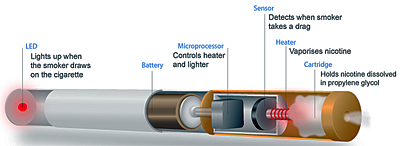 |
|
|
|
Unionsafety has questioned the safety of electronic cigarettes for many years - Public Health England admits more research needed In an article entitled, Is The E-cigarette The New ‘Tobacco Industry Scandal’ Waiting To Surface After The Health Damage Is Done? this website's editor originally questioned the safety of electronic cigarettes (E-cigarettes) and challenged the sudden and early decision by both the NHS and ASH to claim that 'vaping' (the act of producing huge blooms of smoke when using an e-cigarette); is safer than smoking traditional tobacco cigarettes.
Following years of denial of emissions being harmful and claims that the huge clouds of 'vaporised' tobacco contained purely water-vapour; the truth of what the chemicals within the so-called water vapour were, caused serious concerns and questions were rightly asked about what health issues they may be causing to users and none-users alike. It was again established that second-hand smoking was evident from e-cigarettes as it is in ordinary cigarettes. With years of anecdotal evidence and scientific studies confirming the fact that some people's health can be seriously damaged by 'vaping' e.g. popcorn lung, collapsed lungs, and long-term ill health of the user's lungs; are now accepted as a serious risk to, and especially younger people's health as more and more children are now found to be smoking e-cigarettes when they havn't yet been exposed to normal cigarette useage. Now, a new scientific study is coming to its conclusions which those involved are alarmed enough to speak to the media about their findings, even prior to the results being peer-reviewed, They conclude that Vaping could be even more dangerous to health than traditional cigarettes, potentially leading to conditions such as dementia, heart disease, and organ failure in long-term users, according to a startling new study. While the NHS maintains that e-cigarettes are "substantially less harmful than smoking," the findings of Dr. Maxime Boidin from Manchester Metropolitan University suggest that vaping may carry far more risks than previously understood.
Initially, Dr. Boidin thought vaping was a safer alternative to smoking. "At the beginning of the study, I believed vaping was less harmful. But the more I learned, the more I realized how wrong that assumption was," he said. “Many people will be shocked by the truth.” A study at the University of Liverpool's Institute of Sport has raised further alarm, highlighting the adverse effects of both smoking and vaping on the body. Participants between the ages of 18 and 45 underwent stress tests to measure blood vessel elasticity and brain blood flow. After 12 hours of abstaining from smoking, vaping, and exercise, the results were striking. Both smokers and vapers showed severely restricted artery dilation, indicating potential cardiovascular issues. Further tests revealed that blood flow in both groups was similarly impaired, increasing the risk of cognitive dysfunction, including dementia. Dr. Boidin attributes these health issues to inflammation caused by nicotine and the harmful chemicals found in e-cigarettes, including metals, propylene glycol, and vegetable glycerine. “When you introduce this mix of metals and chemicals into your body, you can’t expect no consequences,” he warns.
The study also highlights concerning cases of severe health problems linked to excessive vaping, including collapsed lungs, respiratory failure, and even deaths like that of Hollyoaks star Paul Danan, who suffered respiratory failure due to excessive vaping. Dr. Boidin’s study suggests that even young vapers experience fitness impairments. Adam Petrulevic, a 25-year-old study participant, shared his experience of vaping nonstop for two years, noting how his vaping habits had increased drastically.
Despite the prevailing belief that vaping is far safer than smoking, Dr. Boidin argues that the long-term effects are just as damaging. Public Health England acknowledges the limited evidence on long-term vaping effects, emphasizing the need for further research. In response to growing concerns, the UK government announced plans to ban disposable vapes from June, citing their popularity among teens. Dr. Boidin advocates for stricter regulations, suggesting that vapes should only be available on prescription. "The only benefit of vaping is as a tool to help people quit smoking, but it should only be used for a short time," he says. "If we don’t act now, we’ll be facing a health crisis in the next 10 to 15 years." Speaking privately to unionsafety editor at a national health event on Merseyside, a leading physician and lung expert, said that sadly practising physicians are too frightened to come out against e-cigarettes and admit to the damage they see being done to users and to the fact that society has now swapped one addiction, tobacco cigarettes, for another; nicotine loaded e-cigarettes. This, because of the public message NHS England is wedded to, that E-cigarettes are less damaging than normal cigarettes and their promoting of them as a tool to help quit smoking. Despite there being evidence that they are loaded with nicotine and far more addictive than tobacco cigarettes, and even harder to quit. Rachael Maskell, MP for York Central, has called for tighter controls on vapes, emphasizing that they should only be available to current smokers trying to quit. Meanwhile, Dr. Marina Murphy from the UK Vaping Industry Association, mirroring the behaviour of the tobacco industry for decades during which they knew of the harm and deaths caused by smoking; dismisses the study’s findings, minimising the damage to health we already know about; maintaining that vaping products are safe and carry minimal health risks compared to smoking: “Millions of people have been using vaping products safely for many years. All the available data suggests that vapes are unlikely to exceed 5% of the health risks associated with cigarettes.”, she claimed. However, this study adds to the growing body of evidence that vaping may not be the harmless alternative many have believed it to be. It raises critical questions about the long-term safety of e-cigarettes and calls for more robust regulation to protect public health. Source: Liverpool Echo / The Mirror / NHS / unionsafety and the updated 2023 version of the report here
|


 Dr. Boidin, who is leading the first-ever controlled study on vaping's long-term effects, set to conclude in March, explains that the continuous nature of vaping is a significant concern. "Smokers have to go outside to light a new cigarette, but vapers can keep going, making it harder to track their usage. It's far easier to vape throughout the day, especially in places where smoking is not allowed," he says. Shaken by the results of his own research, Dr. Boidin now believes the health risks for chronic vapers are just as severe as for regular smokers.
Dr. Boidin, who is leading the first-ever controlled study on vaping's long-term effects, set to conclude in March, explains that the continuous nature of vaping is a significant concern. "Smokers have to go outside to light a new cigarette, but vapers can keep going, making it harder to track their usage. It's far easier to vape throughout the day, especially in places where smoking is not allowed," he says. Shaken by the results of his own research, Dr. Boidin now believes the health risks for chronic vapers are just as severe as for regular smokers. Vaping has surged in the UK since the introduction of e-cigarettes in 2005. Current statistics show approximately 5.1 million people aged 16 and over in the UK are now vaping, with the highest rates seen among 16 to 24-year-olds (15.8%). Alarmingly, one million of these vapers never smoked before, a dramatic rise in just three years. Despite the rise in vaping-related health concerns, Public Health England continues to assert that vaping carries only a small fraction of the risks associated with smoking.
Vaping has surged in the UK since the introduction of e-cigarettes in 2005. Current statistics show approximately 5.1 million people aged 16 and over in the UK are now vaping, with the highest rates seen among 16 to 24-year-olds (15.8%). Alarmingly, one million of these vapers never smoked before, a dramatic rise in just three years. Despite the rise in vaping-related health concerns, Public Health England continues to assert that vaping carries only a small fraction of the risks associated with smoking.  One volunteer, Marine, a 33-year-old who started vaping to quit smoking, also reported worsening health. "I vape all day long now, and I’m definitely out of breath more. It’s not doing me any good,” she says. Both volunteers expressed shock at Dr. Boidin's findings and said they planned to quit after learning about the potential health risks.
One volunteer, Marine, a 33-year-old who started vaping to quit smoking, also reported worsening health. "I vape all day long now, and I’m definitely out of breath more. It’s not doing me any good,” she says. Both volunteers expressed shock at Dr. Boidin's findings and said they planned to quit after learning about the potential health risks.